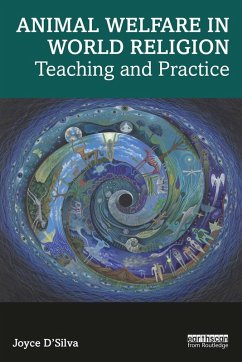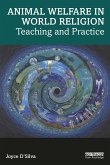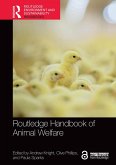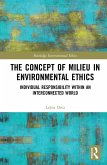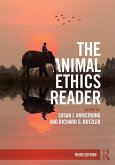Dieser Download kann aus rechtlichen Gründen nur mit Rechnungsadresse in A, B, BG, CY, CZ, D, DK, EW, E, FIN, F, GR, HR, H, IRL, I, LT, L, LR, M, NL, PL, P, R, S, SLO, SK ausgeliefert werden.
Hinweis: Dieser Artikel kann nur an eine deutsche Lieferadresse ausgeliefert werden.
Christiana Figueres, Executive Secretary UNFCCC (2010-2016)
"Joyce D'Silva has compiled, in this book, the teachings of the major religions in the world on kindness to animals. Yet practitioners of the faiths do not relate this teaching to living animals. This book is a beautiful anthology of religious ideals about sentient beings. With her background in activism for animal welfare and multi-faith studies, she has put together a gem of a book on the ocean that separates the teachings of compassion towards animals by world religions and the actual practices towards animals by their followers. A must-read book for all religious believers and those who claim to follow their faith."
Prof. Nanditha Krishna, Director, C.P.R. Institute of Indological Research, Chennai
"This book is an impassioned cry from the heart, a call to the conscience of humanity to heed the principle of compassion at the core of their religions by showing greater concern for our fellow travellers through life, the animals. The chapter on Buddhism is also a searing reminder to Buddhists of how far we have veered from the law of non-harming and the ethic of compassion at the center of our creed."
Ven. Bhikkhu Bodhi, Chair, Buddhist Global Relief
"In my view, if there was one person in the world who is qualified to lay down a challenge to the world's faiths on issues relating to the welfare of animals it is Joyce D'Silva. A fearless campaigner, activist, now Ambassador Emeritus and formally Chief Executive of Compassion in World Farming for nearly 15 years, she speaks with authority and has quite eloquently put together the essence of the teachings of the faith traditions in their relationship with animals. I join her in saying 'take heed' and this is not just about farm animals - it is about all sentient beings. This book is also particularly timely as it adds its voice to the UN campaign on the protection of biodiversity to stem the mass extinction of species resulting from human behaviour."
Fazlun Khalid, Founder, Islamic Foundation for Ecology and Environmental Sciences
"It is ironic that in what is called modern civilization, human abuse of animals takes place on a greater scale and with greater cruelty than ever before, in order to satisfy human self-indulgence. Religions are all too often silent in the face of the terrible cruelty towards sentient beings that takes place, and not infrequently are even partners in such abuse. In so doing, they betray their highest values and ideals. In this excellent book, Dr Joyce D'Silva highlights these higher noble teachings of the world's major religions, thus calling on us all to live up to these ideals. This should mean that today, in the face of the terrible consequences of the livestock industry both for human welfare as well as for animal life, all religions should be advocating for a plant-based diet, which is more available than ever before, thus promoting greater health as well as greater compassion and harmony in our world."
Rabbi David Rosen, CBE, former Chief Rabbi of Ireland and a President of Religions for Peace
"Joyce D'Silva's book is a valuable contribution to the study of religion and animal ethics. The book skillfully combines a scholarly exploration of the ways that animals are understood and treated in the world's major religious traditions with an inspirational message about the sacredness of all sentient beings. D'Silva presents the diversity of views on animals that exist within every tradition, often leading to tensions and conflict within religions, while also underscoring the way that each tradition provides resources for promoting compassion for and better treatment of animals. The book, which provides passages about animals from the scriptures of the world's religions along with profiles of great Saints and thinkers, can serve as an excellent resource for scholars and activists alike. D'Silva applies the teachings found in the various traditions to contemporary issues in animal ethics, including factory farming, vivisection and biodiversity. She shows how in most cultures and traditions, people fall short of their tradition's highest teachings, but she demonstrates how religious texts and exemplars can still inspire us to be guided by their noblest ideals."
Professor Mark Berkson, Professor and Chair in the Department of Religion at Hamline University
"Scientific studies of non-human animals, from apes and whales to birds, rats and octopuses, have increasingly highlighted the fact that they are both sentient and sapient. This makes the cruelty towards animals used for food, clothing, entertainment, pets, trophy hunting and so on particularly shocking and heart breaking. In this meticulously researched book, Joyce D'Silva points out that, in view of our new understanding, the leaders of the world's religions could, and should, play a major role in stressing to their millions of followers the importance of treating all animals with kindness and respect. Animal Welfare in World Religion should be in all libraries and university curricula - you should read it whether or not you have a faith."
Jane Goodall, PhD, DBE, Founder - the Jane Goodall Institute & UN Messenger of Peace
"This book comes at a very appropriate time a few months after the adoption of a historic United Nations Resolution on Animal Welfare (UNEP/EA.5/Res.1). The resolution on animal welfare, environment and sustainable development calls on Member States to recognise that protecting animals and their welfare is an important contribution to the global objectives of protecting the environment, reducing the risks of emerging zoonoses, improving food systems and achieving sustainable development.
This book is an important contribution to understanding the ethical and moral aspects of animal welfare as described in the teachings and practices of religions. Joyce, while not a theologian, has, masterfully, not only told us stories we didn't know derived from religions, but has also showed us that we need to work on our practices that do not often match our beliefs and religious teachings.
Religion is about creation, purpose, destiny, life, and love. People's beliefs about the creator and the creation affect all aspects of their being and behaviour. The book will have a critical influence on how people look to animals. The language of the book is just suitable for everyone, decision makers, faith leaders and the public. This is an important factor in influencing readers. Covering a wide range of religions and addressing many aspects is a highly commendable effort that I hope will promote stronger engagement of religious actors in respecting the welfare of animals who are, to some religions, other communities created by God."
Dr Iyad Abumoghli, Director of Faith for Earth, United Nations Environment Programme (UNEP)
"This is a profoundly affecting and thought-provoking work. When were we taught that mankind is more important than the rest of creation? Was it through religion, or indifference or greed? Can we return to true compassion and find the way back to respecting all sentient beings? Can we live without inflicting cruelty? I urge you read this book, whether you have a faith or not: it may change your life for the better."
Dame Joanna Lumley, Actor and Campaigner
"Joyce D'Silva has spent a lifetime working, with considerable success, to improve the lives of farm animals. And yet there remains much to be done. Around the world, most people have a religious faith and, in this book, Joyce D'Silva looks at how the world's religions see animals and how these religions maintain we should live with them. The result is a book full of optimism and with many surprises. We desperately need everyone to work together to improve the lot of farm animals, which will also benefit wildlife, the environment more generally, and ourselves. This excellent book will help achieve that end."
Rev Professor Michael J. Reiss, University College London
"For those with some biological or medical training, humans are animals and it is normal to think of other sentient beings as similar to humans and very different from inanimate objects. The message in Joyce D'Silva's book is of the 'beautiful teaching' of all of the world's major faiths emphasising the value of non-human individuals and the obligation of people to care for them and consider their needs. For example, the Qur'an refers to non-human communities as like human communities and the Prophet Muhammad equates acts of kindness to humans and to other animals. Indeed, the book emphasises that such an attitude is important for everyone who lives an ethical and compassionate life. A major problem with the world at present is too much emphasis on humans and not enough emphasis on the rest of life."
Donald M. Broom, Emeritus Professor of Animal Welfare, Department of Veterinary Medicine, University of Cambridge
"This is a very timely and important work. It comes at a time when recognition of the interconnectedness of life is so significant for the future of all life and the planet. Readable and authoritative, it is essential reading for those of all faiths and none."
Professor Joy Carter CBE DL Cgeol FGS, Emeritus Professor of Geochemistry and Health, University of Winchester
"Religious faiths are afflicted by a striking paradox: they preach kindness to others, yet rarely speak out against the harms we do to animals - in our farming systems, laboratories, for entertainment, and other purposes. With animals increasingly affected by our actions, it has never been more important that people of faith speak, and act, with kindness toward animals. The majority of humanity follow religious teachings, which have enormous potential to help bring about a better world. By providing key examples from major and lesser-known religions, D'Silva reminds us of the fundamental commitments of faith communities to values such as kindness and compassion for animals. Animal Welfare in World Religion provides the keys to unlocking the potential of religion to bring about a better, kinder world for animals. It should be essential reading for all who care about animals and about living a life consistent with core religious values."
Andrew Knight, Professor of Animal Welfare and Ethics, University of Winchester Centre for Animal Welfare
"Today we stand on the shore of a great ocean of human spiritual evolution, where we extend the Golden Rule - to treat others as we would wish to be treated ourselves - to our non-human, sentient sisters and brothers. Guided by the teachings and practices of the world religions, we set sail on this wondrous journey, and Joyce D'Silva's Animal Welfare in World Religion: Teaching and Practice is the perfect guidebook to steer us on our course. It is such a privilege to share this exciting adventure with someone as insightful as Joyce. I encourage everyone to pick up this guide and set sail."
Barbara Gardner, founder and CEO of the Animal Interfaith Alliance (AIA)
"This book provides a timely and comprehensive look at the major religions and their historical and indeed contemporary approach to animals and animal welfare. The authority of the work is underpinned by the fact that it is written by an individual who has actively made an actual real, measurable, and beneficial improvement in animals' lives over many years.
This is a book which demands attention and deserves to be widely read."
Chris Fegan, Chief Executive, Catholic Concern for Animals
"Clearly written and beautifully argued book...
The author takes great pains to explain the suffering of fellow animals... complex details that even theologians and scholars of religion overlooked and neglected. It is deep and bold thinking on our responsibilities to animals and what religious teachings of the major global faiths and some Indigenous beliefs can help us to develop an ethics of compassion and moral responsibility towards all creatures."
Ibrahim Ozdemir, Professor of Philosophy, Uskudar University, Istanbul, President, Uskudar University Forum on Environmental Ethics, core member of al-Mizan: A Covenant for the Earth.
"Roman Catholic Cardinal Manning in Britain was a major figure in the early 19th Century animal protection movement despite the teaching of St Thomas Aquinas who held that humans have no 'direct' duties to animals. Faith leaders have mostly followed Thomist teachings and have been largely absent from discussions on animal protection and the reinvigoration of global animal protection starting in 1950. However, Joyce D'Silva demonstrates in this very accessible discussion of a variety of global faiths that concern for animals is found in the teachings of all the major world religions. Her very timely, accessible and necessary book appears a little more than seven years after Pope Francis' Laudato Si encyclical - a powerful plea to the world to change its approach to protecting the global environment and the other creatures who share the world with humans."
Andrew Rowan, President of WellBeing International
"The first thing to say is that Joyce D'Silva, the author of this book, is one of the three or four outstanding political campaigners for animal rights of the last fifty years. So she knows a great deal about what she is writing. I happen to agree with every word I have read.
Nearly all the great faiths have said wonderful things about the other animals (the Golden Rule applies). Yet too often they have forgotten this in practice. Why has no modern Pope, nor Archbishop, for example, ever made Animal Rights or Compassion for Animals the central subject for a leading Christian campaign? (Today's Pope Francis gets the nearest.)
Modern Christianity has failed miserably and ought to feel ashamed. This failure was one reason why I lost my Christian faith. (I am sure I am not alone in this.) The founders of faiths have nearly all shown their passionate concern for animals, as have the Saints. Yet their followers - the self-important second raters and bureaucrats have, however, let us all down.
I happen to believe that Jesus too was passionately concerned about the animals being cruelly sacrificed in the Temple. It was a money-making scam and it made him furious. He chucked out the cruel animal exploiters. That is one reason why he was crucified."
Richard Dudley Ryder MA DCP PhD (Cantab) AFBPsS FZS, President, Animal Interfaith Alliance, Past Chair, RSPCA
"Joyce D'Silva has assembled an inspiring collection of 'beautiful words' coined by the fathers of the faiths, humbly aware that when God saw that it was good, he was referring to all life, not just us. Today, these words are largely unknown, forgotten or ignored, and not just by the secular. At a time when compassion for life is not just a moral duty but essential to our common survival, she challenges the current crop of faith leaders to take heed and give a lead."
Professor John Webster, Professor Emeritus, University of Bristol, 'Father of the Five Freedoms'
"In this illuminating book, Joyce D'Silva very clearly makes the case for animal care and welfare in all the great religious traditions of the world. If we are to return any kind of dignity to the animal world - and save the planet from the perils of climate change and biodiversity loss - then we need to urgently align our world with these teachings."
Gopal D. Patel, Co-Founder & Director Bhumi Global
"I've long been interested in the ways in which different religions view and teach about nonhuman animals (animals) and the gulf between their teachings, and how they permit other animals to be treated with little to no respect, dignity, or compassion. I'm not a religious scholar, and when I discovered Joyce Di'Silva's new book Animal Welfare in World Religion: Teaching and Practice, I was immediately interested because she focused on questions I've been pondering in an amateurish way for decades."
Marc Bekoff Ph.D., Psychology Today
"The teaching is there, but it is being ignored. I hope my book can bring it to the forefront in all these faiths, so that their leaders and followers become spokespeople for the wellbeing of animals. Let's unleash these teachings on the world!"
SARX For All God's Creatures
"This is a modern book, which not only looks at the ancient teachings and practices of the faiths, but looks at the views of very modern theologians who are living in today's world of mass animal cruelty, that the writers of the ancient texts could not have imagined. Could the writers of the prescriptions on the most humane way to slaughter an animal for food in an ancient desert wilderness have had any comprehension of the factory farm of the 21st century? Their prescriptions could have been very different if they had. Joyce brings in the views of today's modern theologians who can apply their faiths to today's world - and she describes that world very thoroughly."
Animal Interfaith Alliance
"It is very important that Animal Welfare in World Religion be widely read and its powerful arguments heeded. It has the potential to help shift our imperiled planet onto a sustainable path, leaving a habitable healthy, environmentally sustainable world for future generations."
Richard H. Schwartz, The Times of Israel
"So, here is the huge anomaly - with so many lovely teachings and so many people following these teachings, how come the animals living closest to us, often in our control, are living such wretched lives? Let's not forget the wild creatures too, whose habitats we are destroying all over the world. I decided to explore the whole conundrum in a book: "Animal Welfare in World Religion: Teaching and Practice""
Philip Lymbery
"The book covers the three Abrahamic religions (Islam, Judaism, and Christianity) and Hinduism, Buddhism, Jainism, Sikhism, Rastafarianism, and the religious traditions of the First Peoples in Australia and North America. D'Silva unearths a selection of eloquent texts from the examined faiths that indicate how non-human members of creation should be treated. In most instances, she explicitly addresses what the different traditions have to say about modern intensive agriculture, animal slaughter, vivisection, and the treatment of wildlife. Overall, the book is beautifully written..."
Andrew Rowan, WellBeing International
"This book is an easy and informative read for those with little or no knowledge of other faiths, but it is also an uncomfortable read in that it shows how the abuse of animals is on the increase."
CHURCH TIMES

